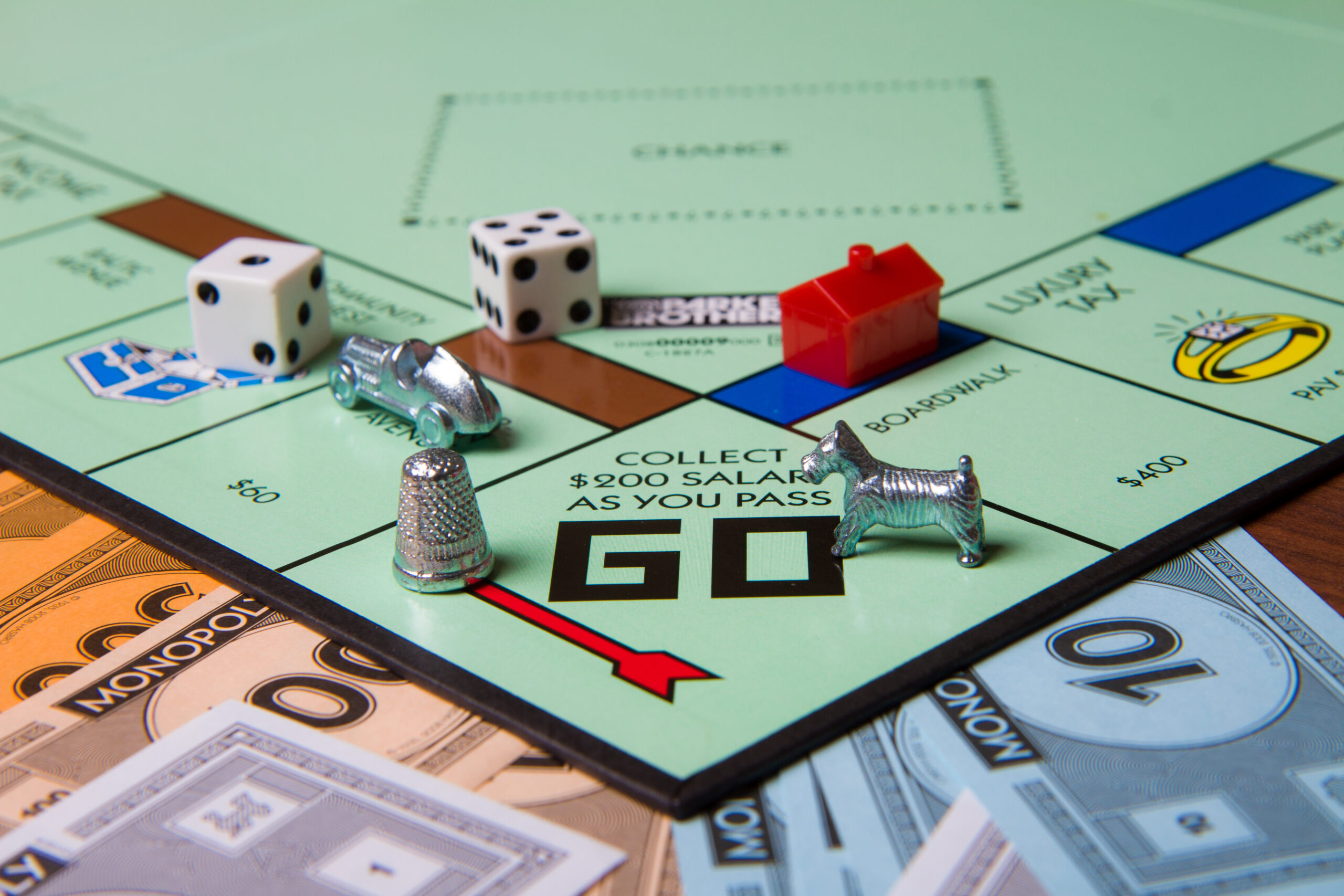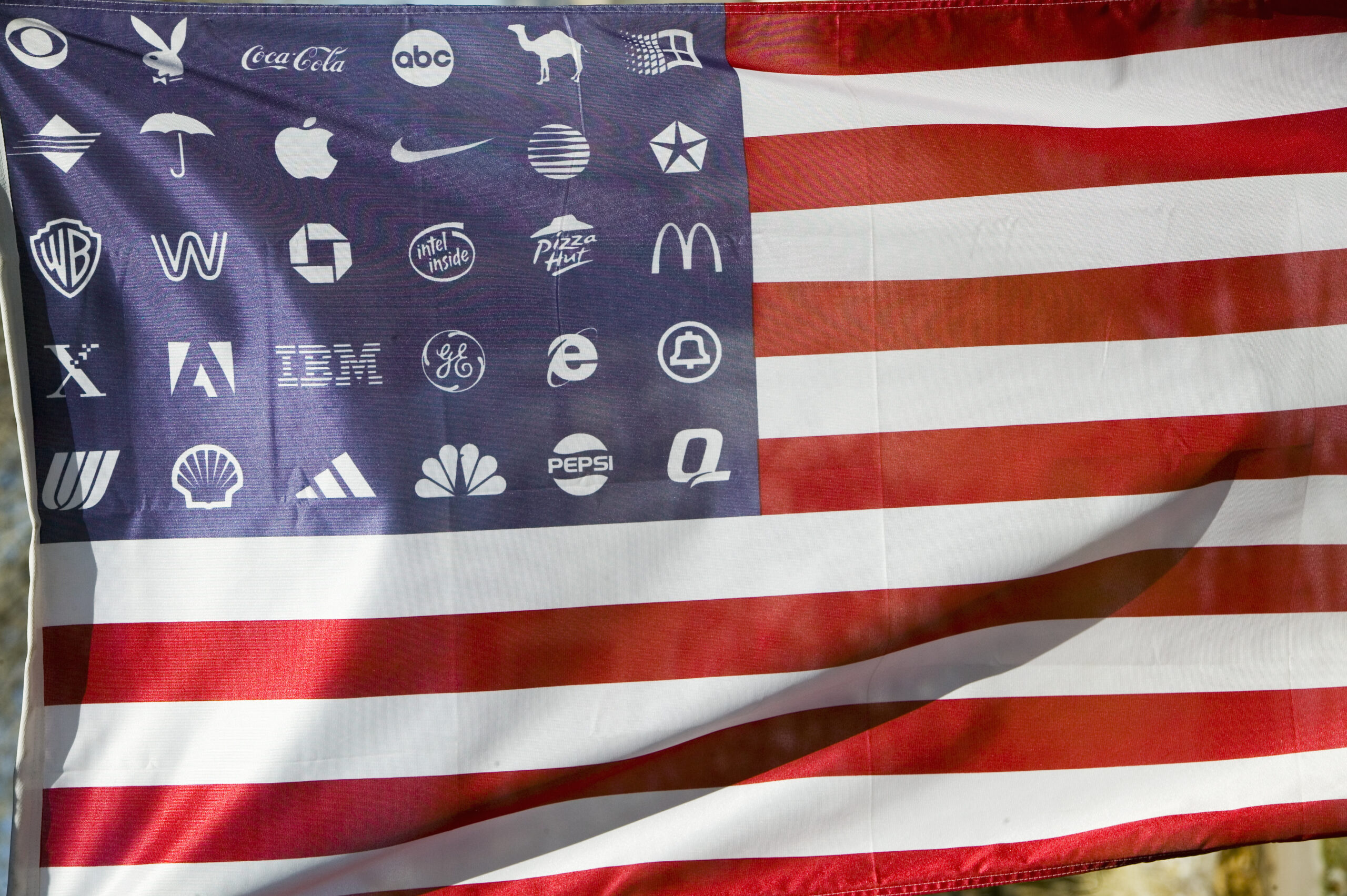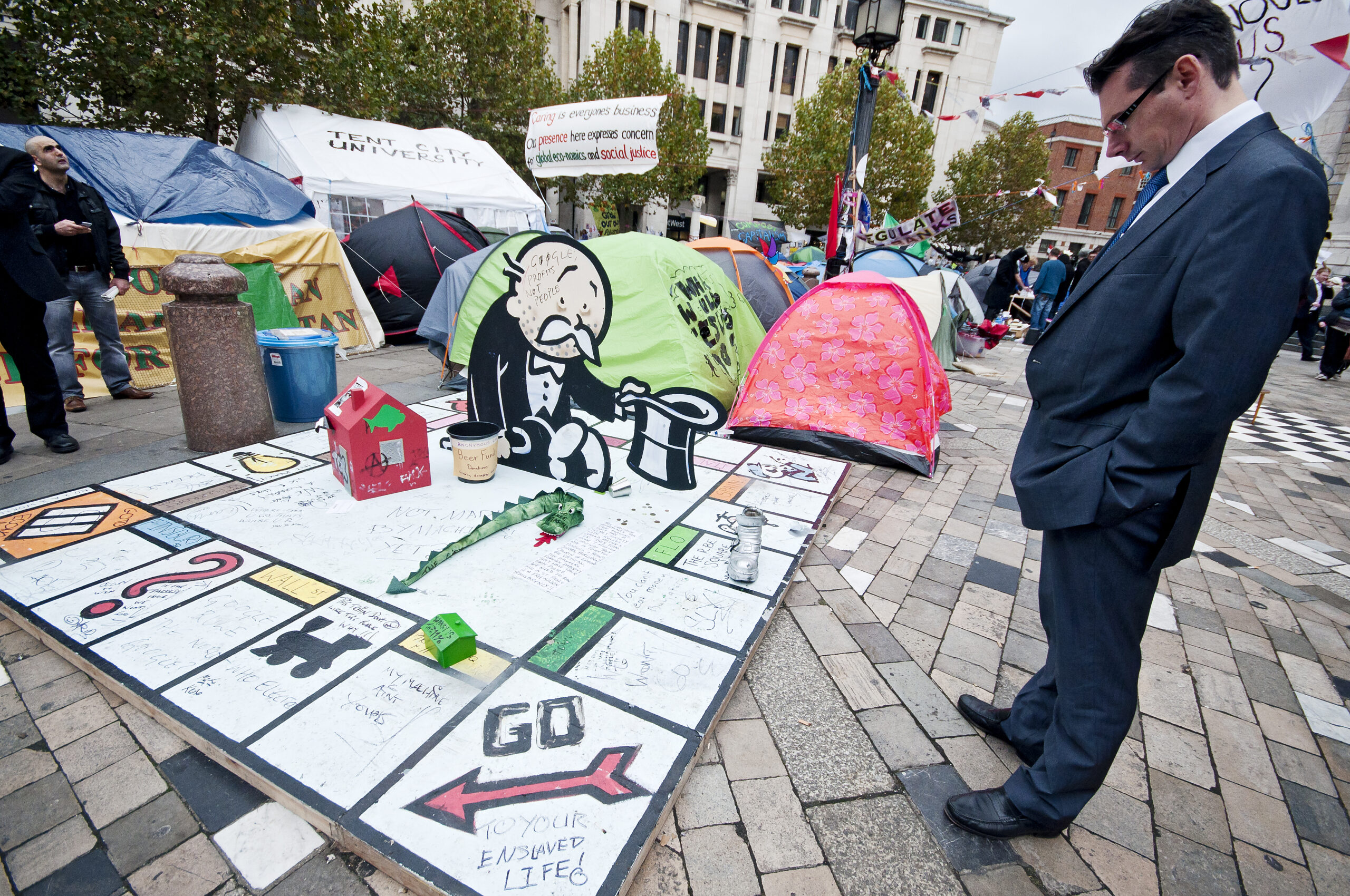Monopoly®
We will use the game of Monopoly® to explain the implications of this form of taxation, providing new currency, and how this Constitutional provision supports The Game of Life as played out in the world, while creating an equal playing field for all.
Using the scenario of playing Monopoly®, it becomes very clear how the poor remain poor, and their numbers increase daily, while the rich remain rich and control the economy, as well as control business law and the government. A few players eventually own all the land, the utilities, and transportation (railroads). Those who don’t own land are still required to pay rents, utilities, and to “take a ride on a railroad” if they want to remain in the game. Eventually, because the Banker only has a limited amount of currency, those who don’t own the limited resources and receive an income from rents won’t have enough money to continue playing the game and will eventually lose the game to bankruptcy.
What is not part of Monopoly® are spaces where a player can land on a job. “CHANCE” and the “COMMUNITY CHEST” are the only sources of other income to the players who do not own land or the spaces that demand payment. However, a player can be affected economically both positively and negatively per chance and being helped by the community. If more jobs were created, the players would have a greater opportunity to stay in the game.

But what about the limited amount of money provided by the Banker that eventually lands in the hands of the few wealthy players? When there’s no more money, how is anyone supposed to continue to play the game? And when you open the game to new players (birth, immigration, trade agreements with other countries, etc.), what are these new players going to use to play the game? The answer: print more money so that the new players can play. But even so, no matter how much money you print, and no matter how many new players sit down and begin playing, the money will always end up in the hands of the rich who own all the spaces where some kind of payment is required.
In essence, our new Constitution provides additional spaces and changes the rules for some spaces so that the other players have the opportunity to play the game longer, in fact, indefinitely, if they so choose. There’s only so much land to be owned, utilities to be owned and profited from, and railroads to ride. The playing board’s space is limited. But the ability of more and more players to play the game and be provided with the money to do so is limited only to the rules applied to the game. Therefore, the rules themselves must be changed.
All of the spaces were bought up before the new players had a chance to enter the game. To play, they have no choice but to roll the dice and see where they will land and to which rich person they will pay money. The number that comes up from chance in rolling the dice is the problem. The players are forced to roll and pay whatever the owner of the space requires. The rents depend on how much money the space owner put into the space’s development (how many houses or hotels).
The only way to keep people playing the game, and maybe have the opportunity to enjoy the game, is to change the rules. THERE IS NO OTHER WAY!
But the first thing to consider is: why is a person forced to play? Why can’t a person simply sit around and watch? One of the reasons is because Monopoly® (i.e., Capitalism) is the only game in town, and if you want money and the opportunity to own land and play, even the money necessary to live, there’s only one way to do it: play the game according to the rules. But what if you don’t want to play the game?

If you exist, you shouldn’t be forced to play the game. And if the game provides the only means for existence, then the rules of the game MUST be changed to, first, benefit the players who want to play and who have benefited from playing the game, by having them support the non-players; and second, make the game worthwhile for everyone in the room.
A huge motivating factor in playing the game is to be able to say that you were successful at it—that you won! Other non-players might be impressed more, if, by your playing the game, they also benefited from your play. Just think how popular and well liked those would be who helped the non-players by providing them with snacks and a comfortable chair from which to sit back and observe the game. The thing is, the onlookers are going to become bored if they are only watching, when, upon observing the game, they are continually strategizing in their own minds how to play the game and to win themselves. Furthermore, if everyone could win, the game would lose its challenge and incentive and no one would want to play. HOWEVER, there is some intrigue in watching the game being played by others and watching their strategies of play and what they do to win and gain the advantage over other players. For this reason, there are countless new entertainment reality shows that people sit around and watch, but in which they would never dream of participating.
In this scenario, as mentioned, Monopoly® is the ONLY GAME IN TOWN! The players who have benefited from it are not likely to change the game and the rules that have so richly benefited them and their families. However, the countless people standing around watching the game are getting angrier and angrier, because they are not being allowed to play or are not benefiting from the game. These masses could easily disrupt the game, tip over the board, and kill the players. So, if the established players begin to realize this, these rich and powerful ones might think twice about changing the rules, affecting the way that the game is played, so that it would include benefits to the non-players.
So it is, in reality, that the few players take some of the money they’ve accumulated in playing the game and surround the playing area with armies and navies and appoint popes and priests that control the people and allow them, alone, to continue playing. Because of advancements in modern technology, a few players have the power to control the masses and protect the game. The people cannot overrun the military that is paid to only be loyal to those few players. Moreover, violence isn’t the answer either, because violent revolutions only lead to still other violent revolutions. Civilized people do not solve problems through violence. They solve conflicts through diplomacy and peer pressure.

As was stated above in hypothetically using Monopoly® as an example, “Just think how popular and well-liked those would be who helped the non-players by providing them with snacks and a comfortable chair from which to sit back and observe the game.” The players play to be recognized as rich and popular. We don’t want to eliminate their ability to obtain self-worth by being rich and popular. But we do want to help them see how changing the rules of the game will quiet the masses and make them even more popular and liked as they successfully play the game in a way that benefits those who aren’t involved in playing the game, or who don’t want to be.
Our proposed new Constitution establishes the new rules for the game that will accomplish what both the players and non-players expect out of being forced to be around each other in the same room where there’s only one game to be played.
The new Constitution gives Congress the actual equation from which it will determine taxation and the issuance of new currency. ALL TAXES WILL BE REPLACED with the set flat-rate consumption tax. Except for the fixed consumption tax, there will no longer be any duties, fees, or taxes on imports and exports. Imports are what foreign entities sell to America to consume. Exports are what America sells to foreign entities to consume. Both have the tax applied equally without loopholes and without exception.
Nothing is sold unless there’s a consumer who demands it. A free market, Supply and Demand Economy, has always been the best way to produce the most innovative and high-quality goods and services. But what about the not-so-good goods and services?

Wal-Mart imports a not-so-good quality product for $1, which, after the proposed tax, becomes $1.20. If the American consumer wants Wal-Mart’s product, the consumer will be forced to pay $1.40, plus whatever profit margin Wal-Mart wants to gain. The imported item is taxed twice, bringing in more revenue to take care of the basic needs of the American people (many who work for Wal-Mart and whose needs are not currently being met). This will affect the Wal-Mart profit margin according to supply and demand. Because if Wal-Mart wants to make a profit, it must stock products that the people want to consume. The higher the price of the product, the less likely the people will consume it en masse.
HOWEVER, having their life needs provided for them by law, the people won’t be forced to buy from Wal-Mart. If Wal-Mart wants to sell good, nutritious food that is better than other stores, then this is where it makes its money, because selling these law-mandated products, there IS NO CONSUMPTION-BASED TAX APPLIED! (As a reminder, this is because the law-mandated basic necessities are given FREE to the people of the Republic.) This motivates Wal-Mart to increase the quality of its products; especially those that people need to consume to live. If Wal-Mart doesn’t provide an apple that is as good as the apple that a competitor provides, Wal-Mart will lose the business.
THIS WILL AFFECT THE FARMERS AND ORGANIC, HEALTH-BASED GROWERS! Ma and Pa Stores can now compete with Wal-Mart by providing a better apple than Wal-Mart, the people having the means provided to them by law to choose where they purchase the nutritious apple. Ma and Pa ARE GUARANTEED SALES IF THEIR PRODUCTS TASTE BETTER TO THE CONSUMER! And Ma and Pa, in providing the nutritious apple, DO NOT HAVE TO PAY ONE CENT IN TAXES and can pocket the money they make and go to Wal-Mart and buy the things that they don’t need. It’s only when they buy from Wal-Mart … the things that they don’t need … that Ma and Pa are forced by law to pay taxes.

Supply and demand runs the economy and benefits government tax revenue, improving the economy and thereby exponentially reducing the consumption tax rate. The people should not be taxed more than their individual economic situation allows. Whereas the GDP (Gross Domestic Product) is the determining factor of an economy, it being the sum of all private consumption (consumer spending), government spending, corporate spending, and the averaged export/import amounts, it determines the overall strength of the people’s ability to pay taxes and still support their economy. All personal and business taxes are replaced by a flat tax on private consumption, corporate spending, and the average of export/import duties (exports-imports). (See the Consumption-Based Taxation section to learn more.)
America’s influence and world power are based on its consumerism. The power of the American consumer to regulate international supply and demand quotas and trade, obligates and controls all other nations under its umbrella of consumerism in pursuit of the American Dream. With liberal immigration policies, more people will come to America. The more people who participate in the economy, the more money that will be needed to support that economy. The more money people have, the more they spend. The more they spend, the more the GDP (Gross Domestic Product) increases. The more opportunity to make money, the less and less the people will depend on the basic government-provided goods and services, wanting more than just the basics, thereby decreasing GS (Government Spending) exponentially. As people work harder to acquire everything outside of their basic needs that are provided by law, the GNP (Gross National Product) increases as they buy the entertainment and luxuries that they want, the nicer homes that they want, and the food that they want, all taxed at the flat-rate consumption tax. This will bring more money into the government’s coffers that will need less and less money as the economy improves.
A side note: world progression towards a more tranquil civilization will increase when other nations realize that their citizens want what America offers, motivating foreign governments to improve the lot of their people so that they will stay in their countries. In addition, as other countries produce the products that Americans want (because it is more beneficial to an American corporation to make a profit from law-mandated goods and services that Americans need), these non-American economies will improve.
THumP® has the solutions. No one else does.®
Note: Congress will have the power to legislate safeguards that limit the inflation rate on all goods and services guaranteed to the people in our Proposed Constitution to 1.5% per annum. See Article I: Section 9(c) and its corresponding Note 9.c to learn more.
Note: Congress will have the power to legislate safeguards that limit the inflation rate on all goods and services guaranteed to the people in our Proposed Constitution to 1.5% per annum. See Article I: Section 9(c) and its corresponding Note 9.c to learn more.

